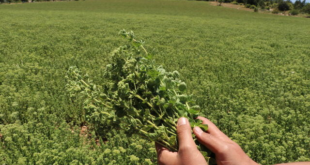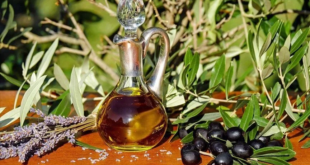Türkiye’s tradition of olive cultivation has been officially recognized and included in UNESCO’s intangible cultural heritage list, according to a statement from Culture and Tourism Minister Mehmet Nuri Ersoy.
The minister, sharing the news on social media platform X on Dec. 5, revealed that the latest UNESCO meeting in Botswana’s Kasane town extensively discussed five cultural elements from Türkiye.

Traditional olive cultivation emerged as one of the selected elements, alongside four others that are currently “on track to join the list,” Ersoy tweeted.
If successful, Türkiye would rank second among countries with the most cultural values on the list, boasting a total of 30, he added.
The recognition of olive cultivation encompasses a myriad of traditional knowledge, skills and methods passed down through generations. This includes tree pruning techniques, olive-picking methods and the ways of olive oil pressing.
Additionally, the social practices associated with these activities, such as olive-picking gatherings, charity traditions and celebrations, will also be safeguarded.
Among the other cultural heritages under consideration are mey/balaban (a small oboe) craftsmanship and performance, iftar (fast-breaking meal) and related sociocultural traditions, mother-of-pearl inlay art and illumination art.

Türkiye’s latest additions to the UNESCO list include two multinational values: Tea culture and the tradition of telling jokes by Seljuk satirist Nasreddin Hodja, a unique and entertaining character from Turkish folklore.
The traditional preparation and consumption of black tea, a symbol of “identity, hospitality, and social interaction,” were recognized for their cultural significance across Türkiye and Azerbaijan.
Describing it as an essential part of daily life, the UNESCO statement emphasized its role in showcasing hospitality, building social ties and celebrating important community moments.
The Turkish tea broke its own record in consumption during the COVID pandemic, increasing from 3.5 to 4 kilograms per person annually, as reported by the International Tea Committee.

Türkiye’s tea culture, symbolized by the preparation of black tea in small samovars and served in tulip-shaped glasses, was celebrated for its role in daily life. The tea is traditionally harvested in the hills of the northeast overlooking the Black Sea region. Notably, this follows the country’s earlier UNESCO recognition of its famous coffee culture in 2013.
UNESCO noted that in some parts of Azerbaijan, meanwhile, tea is enhanced with spices and herbs like cinnamon, ginger and thyme. The organization emphasized that tea culture provides a strong sense of cultural identity across all layers of society.
www.hurriyetdailynews.com
 THE GLOBAL WINDOW OF TURKISH FOOD AND AGRICULTURE The Global Window of Turkish Food and Agriculture Sector
THE GLOBAL WINDOW OF TURKISH FOOD AND AGRICULTURE The Global Window of Turkish Food and Agriculture Sector









